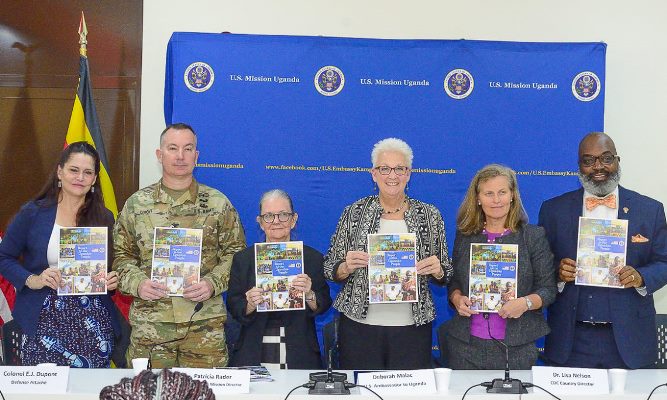In its third annual Report to the Ugandan People, the US government has revealed it spent US$896m in development assistance to Uganda during the last US government financial year Sept. 2017- Sept. 2018, support that has kept the United States as Uganda’s biggest single donor.
Out of this, US$511m was spent on the health sector and more specifically over US$400m on combating the HIV/Aids through various disease prevention and control measures.
Ambassador Deborah Malac, the US envoy to Uganda said their special focus and interest in investing in the health of Ugandans arises from their strong belief that ensuring a strong, healthy and prosperous population is the cornerstone of any country’s development.
“Empowering Uganda’s youth and women depends on a strong health and education system. As such, we invest more money in the health sector than any other, and are working with Uganda to fight HIV, Malaria, tuberculosis and other diseases; improve maternal and child health, enhanced food security and nutrition and strengthen health systems.”
Ambassador Malac noted that over the coming few years, they expect US health assistance to remain stable especially as they try to support Uganda to achieve the 90-90-90 targets aimed at bringing the AIDS epidemic under control.
In 2014, Uganda endorsed the Joint United Nations Programme on HIV/AIDS (UNAIDS) target of ensuring that 90% of all HIV-positive persons are identified, provide antiretroviral therapy (ART) for 90% of those diagnosed, and achieve viral suppression for 90% of those treated by 2020.
She hinted that while US assistance could be affected after that target, the US is investing in other health system strengthening activities to improve efficiency in the sector. One of those initiatives is to strengthen the drug tracking system for US-procured Antiretroviral drugs that go through the National Medical Stores distribution system.
Speaking at a news conference to launch the 3rd Annual Report to the Ugandan People in Kampala, Ambassador Malac said: “On the supply chain issue, we started a programme with the National Medical Stores and the government of Uganda in creating a commodities tracking system that will be able to ensure supply of (commodities like drugs) not just from the centre but ultimately all the way to the facility level to help the government better track where supplies are.”
“We are working to address some of the challenges that have been related with stock-outs of ARVs, but ultimately, they should be able to address similar challenges relating to commodity supplies.”
She however expressed concern at the Uganda government’s failure to increase its health budget to match growing demand for health services arising from both a withdrawal of foreign assistance as well as the country’s growing population.
“I want to be very clear. The government allocation to health, be it for commodities or for systems strengthening, needs to increase, which has not been the case. You can build a very robust system and you can be able to move those commodities, but if the commodities that go through the system are finite, they will run out at a certain time.”
She noted however that she continues to engage with Uganda government officials to ensure that Uganda takes greater responsibility for its healthcare system.
About two years ago, the US government’s support to the HIV/Aids challenge constituted more than 80 percent of the country’s over all spending for the disease. This situation could have worsened because of the fact that several other countries that used to contribute to the HIV/Aids response have cut back on their funding.
Besides support to the health system, the US government’s report highlights a number of activities which they claim have brought a positive change in the lives of millions of Ugandans. Notable among them is the 2,000,000 million free mosquito bed nets that were distributed country-wide and have been credited for significantly reducing malaria-related deaths and illnesses.








